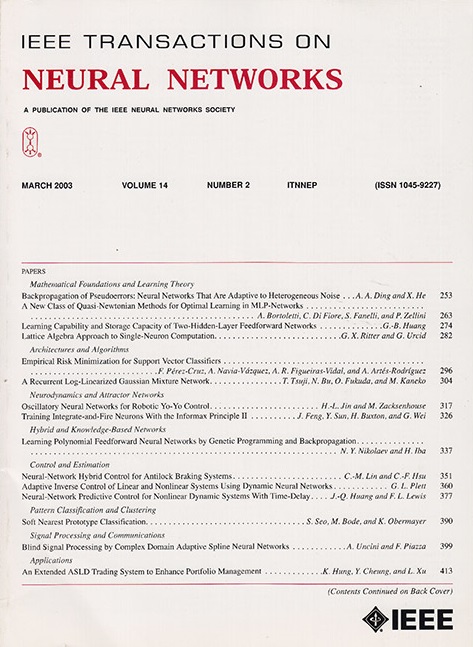D2Fed: Federated Semi-Supervised Learning With Dual-Role Additive Local Training and Dual-Perspective Global Aggregation.
IF 8.9
1区 计算机科学
Q1 COMPUTER SCIENCE, ARTIFICIAL INTELLIGENCE
IEEE transactions on neural networks and learning systems
Pub Date : 2025-07-22
DOI:10.1109/tnnls.2025.3587942
引用次数: 0
Abstract
Federated semi-supervised learning (FSSL) has recently emerged as a promising approach for enhancing the performance of federated learning (FL) using ubiquitous unlabeled data. However, this approach encounters challenges when learning a global model using both fully labeled and fully unlabeled clients. Previous works overlook the dissimilarities between labeled and unlabeled clients, predominantly using shared parameters for local training across these two types of clients, thereby inducing intertask interference during local training. Moreover, these works typically adopt a single-perspective aggregation strategy, primarily focusing on data-volume-aware aggregation (i.e., FedAvg), leading to a lack of comprehensive consideration in model aggregation. In this article, we propose a novel FSSL method termed $\text {D}^{{2}}\text {Fed}$ , which addresses these issues by rethinking the roles of labeled clients and unlabeled ones to mitigate intertask interference during local training and by integrating client-type-aware with data-volume-aware to provide a more comprehensive perspective for model aggregation. Specifically, in local training, our proposed $\text {D}^{{2}}\text {Fed}$ distinguishes between the primary and accessory roles of labeled and unlabeled clients, respectively, performing dual-role additive local training (DALT) accordingly. In global aggregation, $\text {D}^{{2}}\text {Fed}$ uses a dual-perspective global aggregation (DGA) strategy, transitioning from data-volume-aware aggregation to client-type-aware aggregation. The proposed method simultaneously improves both local training and global model aggregation for FSSL without compromising privacy. We demonstrate the effectiveness and robustness of the proposed method through extensive experiments and elaborate ablation studies conducted on the CIFAR-10/100, SVHN, FMNIST, and STL-10 datasets. Experimental results show that $\text {D}^{{2}}\text {Fed}$ outperforms state-of-the-arts on five datasets under diverse data settings.具有双角色加性局部训练和双视角全局聚合的联邦半监督学习。
联邦半监督学习(FSSL)最近成为一种很有前途的方法,可以使用无处不在的未标记数据来提高联邦学习(FL)的性能。然而,当使用完全标记和完全未标记的客户端学习全局模型时,这种方法遇到了挑战。先前的研究忽略了标记客户端和未标记客户端之间的差异,主要是在这两种类型的客户端之间使用共享参数进行局部训练,从而在局部训练过程中引起任务间干扰。此外,这些工作通常采用单视角聚合策略,主要关注数据量感知聚合(即fedag),导致模型聚合缺乏综合考虑。在本文中,我们提出了一种新的FSSL方法,称为$\text {D}^{{2}}\text {Fed}$,该方法通过重新思考标记客户端和未标记客户端的角色来减轻本地训练期间的任务间干扰,并通过集成客户端类型感知和数据量感知来提供更全面的模型聚合视角,从而解决了这些问题。具体来说,在局部训练中,我们提出的$\text {D}^{{2}}\text {Fed}$分别区分标记和未标记客户端的主要和辅助角色,相应地执行双角色加性局部训练(DALT)。在全局聚合中,$\text {D}^{{2}}\text {Fed}$使用双透视图全局聚合(DGA)策略,从数据量感知聚合转换为客户端类型感知聚合。该方法在不损害隐私的前提下,同时改进了FSSL的局部训练和全局模型聚合。我们通过在CIFAR-10/100、SVHN、FMNIST和STL-10数据集上进行的大量实验和详细的烧蚀研究,证明了所提出方法的有效性和鲁棒性。实验结果表明,在不同的数据设置下,$\text {D}^{{2}}\text {Fed}$在5个数据集上的性能都优于目前的算法。
本文章由计算机程序翻译,如有差异,请以英文原文为准。
求助全文
约1分钟内获得全文
求助全文
来源期刊

IEEE transactions on neural networks and learning systems
COMPUTER SCIENCE, ARTIFICIAL INTELLIGENCE-COMPUTER SCIENCE, HARDWARE & ARCHITECTURE
CiteScore
23.80
自引率
9.60%
发文量
2102
审稿时长
3-8 weeks
期刊介绍:
The focus of IEEE Transactions on Neural Networks and Learning Systems is to present scholarly articles discussing the theory, design, and applications of neural networks as well as other learning systems. The journal primarily highlights technical and scientific research in this domain.
 求助内容:
求助内容: 应助结果提醒方式:
应助结果提醒方式:


